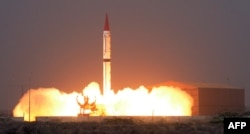Top U.S. lawmakers from both major political parties expressed concern Wednesday about Pakistan's growing nuclear arsenal, saying the country remains a haven for terrorists and a source of radical Islamist extremism.
The powerful House Foreign Affairs Committee held a hearing Wednesday to examine Pakistan's counterterrorism cooperation, its education reform efforts and U.S. aid to Pakistan.
Republican Committee Chairman Ed Royce said Pakistan's nuclear arsenal is on track to be the third largest in the world, and that its addition of small tactical nuclear weapons and longer-range missiles in recent years is even more troubling.
Comparison
This is a country, Royce said, that spends a fifth of its budget on the military, but less than 2.5 percent on education.
Richard Olson, special U.S. representative for Afghanistan and Pakistan, spoke for the Obama administration at the hearing.
The United States has had very candid discussions with Pakistan on its nuclear arsenal and other security concerns, Olson said, adding that the administration is not negotiating the type of nuclear agreement with Pakistan that the U.S. has with India.
Lawmakers raise concerns
Both Democratic and Republican committee members voiced strong concerns that the U.S. has given about $30 billion in economic and military aid to Pakistan since the September 11, 2001, terrorist attacks, saying the government in Islamabad is still deeply involved with supporting terrorist networks.
Several lawmakers accused Islamabad of "playing both sides."
Democratic Representative Brad Sherman asked Olson to communicate to Pakistani officials that Pakistan needs to act like a true partner or, he said, some in Congress would push for eliminating all U.S. aid to the country.
Olson said he would pass along the concerns, but that the Obama administration believes it is in the best interest of the U.S. to continue providing assistance to Pakistan because the government is conducting counterterrorism operations.
Action by Pakistan
Pakistan announced a National Action Plan in January 2015 to deal with extremism and militancy after gunmen attacked a school in Peshawar December 16, 2014, killing more than 130 children.
Ranking Democratic member Eliot Engel said Pakistan itself has suffered the most from terrorist groups within its borders, with more than 50,000 people in the country killed by terrorists since 2003.
Royce said it was not surprising to learn that Tashfeen Malik, the female attacker in the recent San Bernardino, California, shooting that left 14 people dead, had studied at a Pakistani school that spread an intolerant message.
"Pakistan maintains an infrastructure of hate,” Royce said. “Thousands of Deobandi madrassas — funded with Gulf state money — teach intolerant, hate-filled rhetoric that inspires the foot soldiers of jihadist terrorism.
"I've made three trips to Islamabad to press this issue," he added. "Pakistan must do the work to register schools, and close those creating new generations of radicals."
Olson said the Obama administration shares lawmakers' concerns about certain religious centers and schools, and that Pakistan says it is addressing the problem as part of its National Action Plan.






